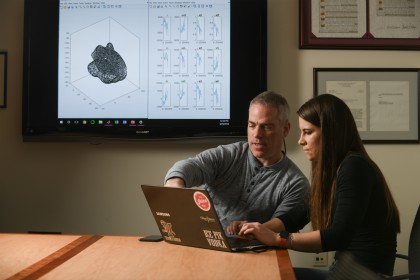Three innovative projects spanning the fields of regenerative medicine, electrophysiology, and infectious diseases were selected to receive SPARK-VT research funding following a June 22 proposal presentation meeting at which University of Vermont faculty applicants pitched ideas to a panel of consultants from the biomedical and biotech arena. The awardees include UVM Larner College of Medicine Department of Medicine faculty members Daniel Weiss, M.D., Ph.D., Jason Botten, Ph.D., and Peter Spector, M.D.

Peter Spector, M.D., and Lara Weed ’19, UVM biomedical engineering student (Photo: David Seaver)
Three innovative projects spanning the fields of regenerative medicine, electrophysiology, and infectious diseases were selected to receive SPARK-VT research funding following a June 22 proposal presentation meeting at which University of Vermont faculty applicants pitched ideas to a panel of consultants from the biomedical and biotech arena. The awardees include UVM Larner College of Medicine Department of Medicine faculty members Daniel Weiss, M.D., Ph.D., Jason Botten, Ph.D., and Peter Spector, M.D.
The SPARK-VT program was established in UVM’s Department of Medicine in late 2012 by Chair of Medicine Polly Parsons, M.D., and was expanded into a university-wide program sponsored by UVM Provost David Rosowsky, Ph.D., and Vice President for Research Richard Galbraith, M.D., Ph.D., in 2014-15. The program’s goal is to provide opportunities for UVM faculty and students to successfully bring innovations to market and launch new companies. SPARK VT relies on the experience and insight of a panel of distinguished and successful entrepreneurs to provide critical evaluation of promising innovative applications of new knowledge. Those adjudged to be most meritorious receive start-up funding and milestone evaluation by the panel.
The 2018 SPARK-VT-funded projects include:
- Development of Tissue-Specific Bioinks for Regenerative Medicine
According to Weiss, regenerative medicine – and particularly, tissue engineering – is advancing at a rapid pace, but there are limitations hindering this process, especially in his area of expertise: generating tissue from lungs. His lab pioneered the development of lung-specific extracellular matrix (ECM) hydrogels derived from specific anatomic components of the lung, such as airways and blood vessels – each of which have distinct biological identities, protein composition, and material properties for use in different regenerative medicine schemes for specific lung diseases. In collaboration with Dimension Inx, an advanced materials company that specializes in creating new, highly functional medical and non-medical materials that are compatible with advanced manufacturing processes, including 3D-printing, the team’s goal is to cast or 3D-print organ- and tissue-specific derived ECM into user-defined forms for tissue repair and regeneration applications.
- Development of Monoclonal Antibodies for Treatment of Hantavirus Disease in North America
Botten’s work proposes to develop a potent neutralizing antibody therapy against Sin Nombre hantavirus (SNV). He says that “because greater than 95 percent of North American Hantavirus Pulmonary syndrome (HPS) cases are caused by SNV, our therapy has the potential to be a first-line therapeutic and/or prophylactic for the treatment or prevention of HCPS in the United States and Canada.
-
You Have to See AF to Treat AF
CoreMap is a company founded by Spector, a UVM professor of medicine and cardiologist specializing in electrophysiology (EP), in order to solve a clinical challenge that faced clinicians – the inability to see a patient’s atrial fibrillation (AF) at a great enough resolution to treat it. AF is the most common heart rhythm disorder, affecting an estimated 35 million patients worldwide. Working with CoreMap CEO Sarah Kalil, Spector is developing a diagnostic catheter and EP mapping software that allows physicians to see AF with greater clarity, thereby providing a solution to treating AF more effectively.
“Now in its sixth year, the University’s SPARK-VT program has identified and supported a large number of promising research discoveries on a path toward commercialization,” says UVM Provost David Rosowsky. “I congratulate Professors Weiss, Botten, and Spector on being selected by the panel to receive SPARK-VT funding this year. They are joining an impressive cohort of successful scholars and companies whose work was supported by SPARK-VT, an integral part of our rapidly-growing ‘Innovation and Entrepreneurship Ecosystem’ at UVM and across Vermont.”
Learn more about SPARK-VT.